THE GROOP
Melbourne 1964-69
The Groop, Mark I, 1964-66
Peter Bruce (guitar)
Peter McKeddie (vocals)
Max Ross (bass)
Richard Wright (drums, vocals)
The Groop Mark II, 1966-69
Brian Cadd (aka Brian Caine) (keyboards, vocals)
Ronnie Charles (vocals)
Don Mudie (guitar) (Oct. 68 - May 69)
Max Ross (bass) ( - Oct. '68)
Richard Wright (drums, vocals)
History
The Groop Mark I
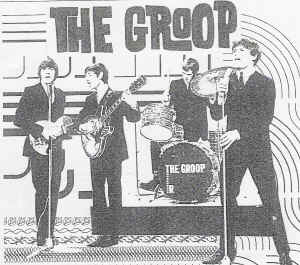 One of many "two-phase" groups that featured in the Aussie
rock scene of the 60s, the first incarnation of The Groop emerged from Melbourne's thriving performing circuit in 1966, with a
unique sound which hinged around a mixed repertoire of soul classics,
big beat numbers and whimsical originals from all four
members.
One of many "two-phase" groups that featured in the Aussie
rock scene of the 60s, the first incarnation of The Groop emerged from Melbourne's thriving performing circuit in 1966, with a
unique sound which hinged around a mixed repertoire of soul classics,
big beat numbers and whimsical originals from all four
members.
The Groop originated as The
Wesley Three, a folk trio formed by schoolfriends from
Melbourne's exclusive Wesley College, Peter McKeddie, Max Ross and
Richard Wright. This group is listed (erroneously?) in the Who's
Who of Australia Rock as the Oxford Trio. The Wesley Three
signed with CBS Australia label in 1964 and released a single, an EP
and an album
The Wesley Three evolved into The Groop in 1965 with the
addition of English-born guitarist Peter Bruce, who was recruited
through a 'musicians wanted' ad in a music shop window. The
Groop's publicity touted Bruce as being an ex-member of The Dave Clark
Five, but this was only half-true. In the May 2002 issue of the Dave
Clark Five magazine, Peter finally came clean to writer Alan Harvey
about his link with Dave Clark. Peter had known Dave in the UK, when
Clark because in 1957 DC had a skiffle band, The Dave Clark Quintet,
and Bruce was in another skiffle band, The Hill City Skiffle Group
(later Rocky Lee and his Cats). They played gigs together and Bruce did
PR for both groups.
"I was never a member of the Dave Clark
Five, despite the stories. When Dave and the guys came to tour
Australia I asked him if I could use the group's name to help promote
my own band The Groop, he was happy for me to use his name anyway I
wanted to help us kick off (which I did). So I said I had been a member
of the pre-famous DC5 which of course I never was, although I had been
around when they first started."
The Groop drew on a range of diverse musical influences
including jug-band and Cab Calloway-style "jump" music, as well as zany
vaudeville/cabaret material. They performed on the Melbourne upper-class social
circuit, establishing a solid following with gigs at debutante balls,
college formals and similar events. After signing to CBS in 1965 they
released theur first two singles, "Ol' Hound Dog" and the double-entendre laden "The Best In
Africa". Although considered by some as frivolous novelty records,
they proved very popular both with radio programmers and the buying
public, and both made the Top 20 in Melbourne.
Their self-titled debut album (CBS 1965) featured severeal witty originals, together with covers of
staples like Them's "Gloria"; it sold in respectable numbers, particularly
in their hometown, where they were feted as a top-drawer live
attraction, strongly supported by regular airplay on Melbourne radio
stations 3UZ and 3AK, TV appearances and consistently favourable and prominent
coverage from the fledgling Go-Set magazine. (Go-Set,
and especially staff writer Ian "Molly" Meldrum, championed them
throughout their career).
A third single, the vaudeville-styled "I'm Satisfied" (b/w "Bad
Times") gave them their best chart placing to date, and the band also
recorded a second LP, I'm Satisfied, in mid-66, but their fourth single "Empty Words" /
"The Gun And Flowerpot Trick" stiffed, so McKeddie and original
manager Tony Dickstein decided to head for England in
August 1966, leaving the band in disarray. Rare 1966 videos of the original Groop performing "I'm Satisfied" and "Empty Words" (probably on Kommotion) can be viewed on YouTube.
Peter Bruce then tendered his resignation, leaving the
rhythm section of Max Ross and Richard Wright to re-build the group.
They first recruited the multi-talented Don Mudie, and were soon
successful in wooing singer Ronnie Charles (Ron Boromeo) and
keyboardist Brian Cadd (who, at Molly Meldrum's suggestion, briefly
changed his surname to Caine) from The
Jackson Kings, who had been performing around Melbourne, with
a residency at Melbourne's premier blues/rock haunt Garrison and had
released a couple of R&B-styled singles on CBS.
The Jackson Kings had attracted The Groop's attention when
they supported them at McKeddie's farewell party. The Groop were
apparently only interested in Ronnie and didn't really want a keyboard
player at all, but Ronnie stuck by his mate and suggested that
Brian be taken on as well. Most accounts of The Groop have wrongly
reported this story in reverse
(i.e. that the band wanted Brian but didn't
want Ronnie) however both Ronnie and Caddie have
recently confirmed the fact that it was Ronnie who was first approached
to join the band.
The Groop Mark II
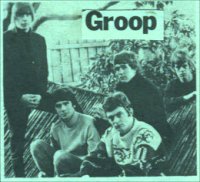 The
new lineup made its recording debut in late '66 with a
storming rendition of Solomon Burke's "Sorry" (b/w Bo Diddley's "Who Do
You Love"), scoring a national Top 10 hit. Both
live and on record, Ronnie Charles' gritty, soulful voice was the
undoubted focus (not to mention his dark, sultry looks that appealed to
a growing contingent of young lady followers) but the new Groop proved
to be an extremely tight, musically dextrous and creative pop band,
each of whose members contributed to the songwriting.
The
new lineup made its recording debut in late '66 with a
storming rendition of Solomon Burke's "Sorry" (b/w Bo Diddley's "Who Do
You Love"), scoring a national Top 10 hit. Both
live and on record, Ronnie Charles' gritty, soulful voice was the
undoubted focus (not to mention his dark, sultry looks that appealed to
a growing contingent of young lady followers) but the new Groop proved
to be an extremely tight, musically dextrous and creative pop band,
each of whose members contributed to the songwriting.
In May 1967 saw the release of the soul-inflected,
reverb-drenched "Woman You're Breaking Me" (b/w "Mad Over You", which
was written by, and heavily featured drummer
Richard Wright, with organist Brian Cadd. This was a major hit -- #6 in
Melbourne, #12 in Sydney -- and even charting in some key American
centres when it was put out by Columbia Records there. The single was
followed by an album of the same name. It was a strong collection of
originals and well-chosen covers that were mostly drawn from the band's
current popular performing repertoire. It's also notable as one of the
first Australian pop LPs to be recorded in stereo.
The peak of The Groop's career came in July, when they took
out the grand prize in the Hoadleys'
Battle of the Sounds, competition, ahead of other worthy
finalists like The Questions, James Taylor Move and Gus & the
Nomads. The prize, provided by the Sitmar line, was passage for the
whole group by on a cruise liner to England, with gig and recording
opportunities. Ian Meldrum enthusiastically reported in Go-Set
about the band's winning turn:
"It was The Groop's day. Their
performance was brilliant and they left no doubts in anyone's mind that
they will be great ambassadors overseas, both with their music and
their personalities"
Ronnie Charles was optimistic about the British jaunt,
because, unlike the previous year's Hoadleys winners The Twilights, The
Groop had secured a round of gigs while they were there. Ron remembers:
"...(we were) up and down the country, at
The Revolution (with Ringo in the audience!), The Speakeasy, The
Marquee, anywhere that would have us!"
During The Groop's eleven-month stay in Europe, they made several recordings. CBS UK issued both "Woman You're
Breaking Me" / "Mad Over You", and a second single, "Lovin' Tree" /
"Night Life", made the Top 10 in Germany, and
they toured there successfully in July that year. Perhaps the most
intriguing of these sessions was the one that yielded the notorious,
raunchy "Maid Of Iron", a collaboration with Harry Vanda and George
Young that was cut at The Easybeats' London recording HQ, Central Sound
in Denmark Street. The song was never released, most likely because of
its supposedly questionable lyrical content; another track,
"Mandrake Wine", also remains unissued.
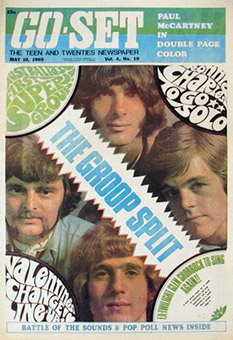 The only officially-released English recordings came out on an
early 1968 single. "Seems More Important To Me" was a multifaceted
rocker with Sgt Pepper-style guitar flourishes. The
flipside, also a Ross/Cadd original, was a whimsical, bass-driven
roundelay called "Annabelle Lee". Sadly, this absolutely superb
acid-pop double A-side record failed to chart after its release in
Australia. However, the Ross-Cadd team had some success in
placing tunes with other artists, notably "When I Was Six Years Old",
which was a hit for both English singer Paul Jones and Australia's Ronnie Burns. They also came to
the assistance of The Masters
Apprentices
-- they had just lost their songwriter Mick
Bower, who was forced to leave the group after suffering a nervous
breakdown -- and the Cadd-Ross song "Silver People" (retitled "Elevator
Driver" for their version) proved to be a vital stepping stone in
group's continued career, providing them with a national Top 10
hit.
The only officially-released English recordings came out on an
early 1968 single. "Seems More Important To Me" was a multifaceted
rocker with Sgt Pepper-style guitar flourishes. The
flipside, also a Ross/Cadd original, was a whimsical, bass-driven
roundelay called "Annabelle Lee". Sadly, this absolutely superb
acid-pop double A-side record failed to chart after its release in
Australia. However, the Ross-Cadd team had some success in
placing tunes with other artists, notably "When I Was Six Years Old",
which was a hit for both English singer Paul Jones and Australia's Ronnie Burns. They also came to
the assistance of The Masters
Apprentices
-- they had just lost their songwriter Mick
Bower, who was forced to leave the group after suffering a nervous
breakdown -- and the Cadd-Ross song "Silver People" (retitled "Elevator
Driver" for their version) proved to be a vital stepping stone in
group's continued career, providing them with a national Top 10
hit.
Just before its return to Australia in October 1968, Max Ross
left due to illness, and he was not replaced; Don Mudie switched to
bass and the band continued as a four-piece. Don Mudie proved to be a
perfect songwriting foil to Brian and their bubbling, organ-propelled
"Such A Lovely Way" was released in 1968 to great acclaim, making the
national Top 20. Nevertheless, the band had become destabilised and
restless in the wake of founding member Ross' departure. Another
significant factor was that Cadd had fallen under the spell of The
Band's seminal Music From Big Pink (evident in the
choice of Richard Manuel's "We Can Talk" as the b-side of "Such A
Lovely Way") and he was keen to move his music in that direction.
After their tenth single, a fine soul-inflected groover called
"You Gotta Live Love" / "Sally's Mine", was ignored, The Groop
abruptly broke up mid-year. In spite of the recent chart failure
they were still extremely popular, so there was shock on the
Australian pop scene when it was splashed over the cover the 10 May edition of Go-Set.
The Groop breakup and the formation of Cadd and Mudie's new band Axiom was extensively
covered by Go-Set over succeeding weeks, and there was evidently some
rancour about the fact that (as they later admitted) Cadd and Mudie had
been considering the move for some time, but had not advised Richard and Ronnie about it.
There was one final triumph for The Groop, though few knew
of their role in it at the time. In much the same fashion as studio band Pastoral Symphony -- whose
1968 hit "Love Machine" was essentially an augmented Twilights, with
Ronnie Charles on backup vocals -- The Groop played a major part a
similar project that commenced in late 1968 with producer Ian Meldrum
engineer John Sayers and arranger John Farrar (The Strangers) -- the
groundbreaking studio epic "The Real Thing" by Russell Morris. The Groop's rhythm section
(Cadd, Mudie and Wright) provided the backing for the basic track,
which was augmented with further session contributions by Zoot
guitarist Roger Hicks, plus Ronnie Charles and Maureen
Elkner on backing vocals. Released in March 1969, it
dominated the #1 spot in the middle months of that
year. The Groop also provided the backing for Morris' hit sequel, "Part
Three Into Paper Walls". The connection with Morris in fact went back
several years -- The Groop gave Russell's first band Somebody's Image
their initial break onto the Melbourne scene by giving them support
spots at local gigs.
After The Groop
Ronnie Charles embarked on his solo
career with the recording of two tracks for a planbned debut solo
single -- the sumptuous "Katy Jane" and a specially-penned
Billy Thorpe song titled "Natural Man", which is aprticularly
ineresting to collectors since it features the (otherwise unrecorded)
Lobby
Loyde-era Aztecs as backing band. Unfortunately, due in part to record
company politics, it was never released.
In early 1970 Ronnie formed Captain Australia and the Honky
Tonk with ex-Somebody's Image member Brian Hollaway and ex-Grooper
Richard Wright. Wright quit in August, and joined a shortlived trio
called Love Story with Buddy England and singer-guitarist and former Go!! Show host Ian "Turps"
Turpie. They released one single, "Neanderthal
Man" / "But Not For Me" on the Air label in September. Wright then joined
Wizard (1971) followed by a spell in seminal country-rock band
Sundown, which also featured Keith Glass
(18th Century Quartet, Cam-Pact), Mark Barnes (Party Machine, Cam-Pact)
and Kerryn Tolhurst
(Adderly Smith Blues Band, Country Radio, Mississippi, Dingoes).
Captain Australia disbanded in early 1971, and Ronnie returned to England. In 1973 he released
two quality albums -- the first was the self-titled album by his band Atlas, a hard rock group featuring ex-members of
Wishbone Ash and Renaissance. It was followed by Ronnie's first solo album, the lavish Prestidigitation,
an ambitious rock-orchestral project produced by American impressario
Lou Reisner and backed by the London Symphony Orchestra and English
Chamber Choir. A single lifted from it, an orchestral
version of Eric Clapton's "Layla", charted in some European countries.
Unfortuntately the album came out just as punk was taking off in
the UK and it sank without trace, and has regrettably never been
re-released. Ronnie continued to record and perform through the late
seventies-early eighties, including much session work, and his
distinctive voice could also be heard on many advertising
jingles. He returned to Australia in the late 1970s. In 1980 he
recorded a single backed by Melbourne band The Runners, "Rock and Roll
Hoodlum" / "Aim for the Stars", which came out on the Full Moon label.
As well as issuing a second solo album, Hands Off, in 1983, Ronnie also
performed with White Light Orchestra, Turbo Luv Nuns, Running Scared
and Post Mortem during the 1980s. He still lives in Melbourne and
currently fronts Ronnie Charles & The Retro Bandits.
In late 1969, Don Mudie and Brian Cadd teamed with former
Twilight Glenn Shorrock to create one of Australia's first supergroups,
Axiom, who achieved
considerable success with a batch of strong singles and two superb LPs.
After the demise of Axiom, Cadd played a major role in the recording of
Russell Morris' acclaimed solo LP Bloodstone
(1971), and then embarked on a very successful solo career, which is
documented in detail on our Brian
Cadd page.
The Groop reformed for a national tour which spanned late 1988 and early 1989. It was a welcome treat for fans, being an
amalgam of both Mk I and Mk II members, including original singer Peter
McKeddie and his successor, Ronnie Charles. The well-received reunion
tour coincided with the release of Glenn A. Baker and Pete Shillito's
CD compilation for CBS, The Best and The Rest.
Thrilling nostalgic audiences with a non-stop barrage of hits from the
stages of regional clubs on most of eastern Australia, the reconvened
Groop proved conclusively what an immense contribution they had made to
Australian rock music.
Original article by Paul Culnane (revised 2007)
Discography
Singles
Dec. 1965
"Ol' Hound Dog" / "Cry Baby Cry" (CBS BA-221234)
2/66
"The Best In Africa" / "Gloria" (CBS BA-221257)
6/66
"I'm Satisfied" / "Bad Times" (CBS BA-221291)
1966
"Empty Words" / "The Gun & Flowerpot Trick" (CBS BA-221319)
1966
"Sorry" / "Who Do You Love?" (CBS BA-221356)
1967
"Woman You're Breaking Me" / "Mad Over You" (CBS BA-221406)
1967
"Seems More Important To Me" / "Annabelle Lee" (CBS BA-221457)
1967
"Lovin'Tree" / "Night Life" (CBS BA-221485)
1968
"Such A Lovely Way" / "We Can Talk" (CBS BA-221583)
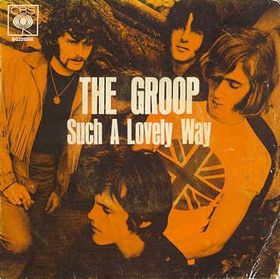
1968
"You Gotta Live Love" / "Sally's Mine" (CBS BA-221640)
1969
"The Jet Song (When The Weekend's Over)" / "Nobody At All" (Stateside
OSJ-8950)
EPs
1965
Ol' Hound Dog (CBS BG 225114)
1966
Woman You're Breakin' Me (CBS BG 225162)
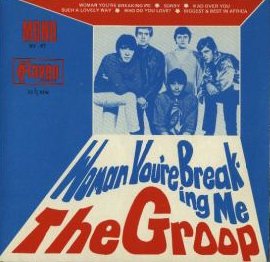
1968
Such A Lovely Way (CBS BG-225205)
Albums
1965
The Groop
(CBS BP-233305)
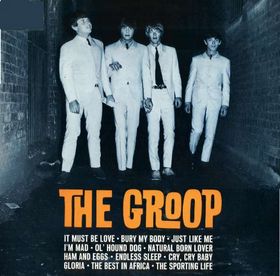
1966
I'm Satisfied
(CBS BP-233337)
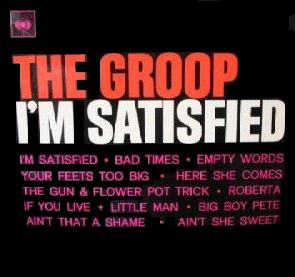
1967
Woman You're Breakin' Me
(CBS BP-233460)
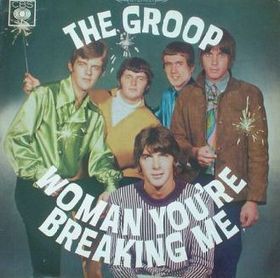
"Baby Blue"
"Downtown Women"
"Good Time Baby"
"Happy With a Love Like Yours"
"I Just Don't Know What to Do With
Myself"
"I'll Be Damned"
"Mad Over You"
"Reach for the Sun"
"Sorry"
"Thinking About the Things"
"Turn On Your Lovelight"
"Woman You're Breaking Me"
1968
Great Hits From The Groop
(Music For Pleasure MFP 8132)
1989
The Best and The Rest 1965-1969 (CBS 463480-2) CD
"Watch Your Step"
"Come On Now"
"Ol' Hound Dog"" (Max Ross-Peter McKeddie)
"The Best In Africa" (Peter Bruce)
"Empty Words" (Max Ross)
"Little Man" (Peter McKeddie-Richard Wright)
"Who Do You Love?" (McDaniel)
"Sorry" (Solomon Burke)
"Mad Over You" (Ronnie Charles)
"Baby Blue" (Bob Dylan)
"Woman You're Breaking Me" (Richard Wright-Brian Cadd)
"Seems More Important To Me" (Max Ross-Brian Cadd)
"Annabelle Lee" (Max Ross – Brian Cadd)
"Thinkin' ' Bout The Things" (Max Ross-Brian Cadd)
"Happy With A Love Like Yours" (Max Ross-Brian Cadd)
"Night Life" (Max Ross – Brian Cadd)
"Sally's Mine" (Brian Cadd-Don Mudie)
"We Can Talk" (Richard Manuel)
"You Gotta Live Love" (Brian Cadd-Don Mudie)
"Such A Lovely Way" (Brian Cadd-Don Mudie)
Tracks 1-2: The Jackson Kings / 3-6: The Groop Mk I. / 7-20: The Groop
Mk II.
Compiled by Glenn A Baker and Pete Shillito.
Session recordings for other artists:
Pastoral Symphony:
May 1968
"Love Machine" / "Spread A Little Love Around" (Festival FK-2343)
- One-off studio project, featuring Ronnie Charles on backing vocals,
with others
Russell Morris
Mar. 1969
"The Real Thing" / "It's Only A Matter Of Time" (EMI Columbia DO 8710)
Jul. 1969
"Part Three Into Paper Walls" / "The Girl That I Love" (EMI Columbia DO
8828)
- Russell Morris (vocals) with backing by The Groop and others.
Ronnie Charles solo
see Ronnie Charles
page
Brian Cadd solo
See Brian Cadd page
References/Links
Many thanks to Ronnie Charles and Brian Cadd for corrections and additional information.
Glenn A. Baker
liner notes from The Best & The Rest CD
compilation
Alan Harvey
Dave Clark Five magazine, May 2002
Ian McFarlane
Encyclopedia of Australian Rock & Pop
http://www.whammo.com.au/encyclopedia.asp?articleid=859
Chris Spencer & Zbig Nowara
Who's Who Of Australian Rock
 One of many "two-phase" groups that featured in the Aussie
rock scene of the 60s, the first incarnation of The Groop emerged from Melbourne's thriving performing circuit in 1966, with a
unique sound which hinged around a mixed repertoire of soul classics,
big beat numbers and whimsical originals from all four
members.
One of many "two-phase" groups that featured in the Aussie
rock scene of the 60s, the first incarnation of The Groop emerged from Melbourne's thriving performing circuit in 1966, with a
unique sound which hinged around a mixed repertoire of soul classics,
big beat numbers and whimsical originals from all four
members. The
new lineup made its recording debut in late '66 with a
storming rendition of Solomon Burke's "Sorry" (b/w Bo Diddley's "Who Do
You Love"), scoring a national Top 10 hit. Both
live and on record, Ronnie Charles' gritty, soulful voice was the
undoubted focus (not to mention his dark, sultry looks that appealed to
a growing contingent of young lady followers) but the new Groop proved
to be an extremely tight, musically dextrous and creative pop band,
each of whose members contributed to the songwriting.
The
new lineup made its recording debut in late '66 with a
storming rendition of Solomon Burke's "Sorry" (b/w Bo Diddley's "Who Do
You Love"), scoring a national Top 10 hit. Both
live and on record, Ronnie Charles' gritty, soulful voice was the
undoubted focus (not to mention his dark, sultry looks that appealed to
a growing contingent of young lady followers) but the new Groop proved
to be an extremely tight, musically dextrous and creative pop band,
each of whose members contributed to the songwriting.  The only officially-released English recordings came out on an
early 1968 single. "Seems More Important To Me" was a multifaceted
rocker with Sgt Pepper-style guitar flourishes. The
flipside, also a Ross/Cadd original, was a whimsical, bass-driven
roundelay called "Annabelle Lee". Sadly, this absolutely superb
acid-pop double A-side record failed to chart after its release in
Australia. However, the Ross-Cadd team had some success in
placing tunes with other artists, notably "When I Was Six Years Old",
which was a hit for both English singer Paul Jones and Australia's
The only officially-released English recordings came out on an
early 1968 single. "Seems More Important To Me" was a multifaceted
rocker with Sgt Pepper-style guitar flourishes. The
flipside, also a Ross/Cadd original, was a whimsical, bass-driven
roundelay called "Annabelle Lee". Sadly, this absolutely superb
acid-pop double A-side record failed to chart after its release in
Australia. However, the Ross-Cadd team had some success in
placing tunes with other artists, notably "When I Was Six Years Old",
which was a hit for both English singer Paul Jones and Australia's 



